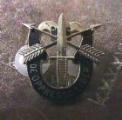Article 43
1. All Members of the United Nations, in order to contribute to the maintenance of international peace and security, undertake to make available to the Security Council, on its call and in accordance with a special agreement or agreements, armed forces, assistance, and facilities, including rights of passage, necessary for the purpose of maintaining international peace and security.
2. Such agreement or agreements shall govern the numbers and types of forces, their degree of readiness and general location, and the nature of the facilities and assistance to be provided.
3. The agreement or agreements shall be negotiated as soon as possible [
JMM: Never done] on the initiative of the Security Council. They shall be concluded between the Security Council and Members or between the Security Council and groups of Members and shall be subject to ratification by the signatory states in accordance with their respective constitutional processes.
.....
Article 45
In order to enable the United Nations to take urgent military measures, Members shall hold immediately available national air-force contingents for combined international enforcement action. The strength and degree of readiness of these contingents and plans for their combined action shall be determined within the limits laid down in the special agreement or agreements referred to in Article 43 [
JMM: Never done], by the Security Council with the assistance of the Military Staff Committee.













 - if we go in there swinging like a drunken bar brawler and taking out more civvies than gooks. How to avoid this?
- if we go in there swinging like a drunken bar brawler and taking out more civvies than gooks. How to avoid this? ; but they do exist. In truth, I don't expect to see a permanent UN Security Force in my lifetime (I don't know about brother Bolton).
; but they do exist. In truth, I don't expect to see a permanent UN Security Force in my lifetime (I don't know about brother Bolton).



Bookmarks